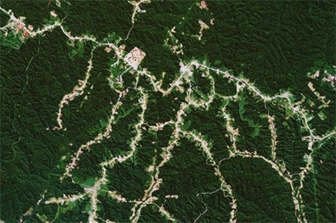Land reform agency sanctions logging in Amazon rainforest park
Land reform agency sanctions logging in Amazon rainforest park
mongabay.com
August 21, 2007
Under the guise of a sustainable development scheme, a Brazilian land agency has granted large tracts of Amazon rainforest to colonists who quickly resold the forest to loggers, alleges a new report from Greenpeace. Some of the concessions were in the Amazon National Park, a national park.
Inequality of land distribution has long been a problem in Brazil, with a small number of wealthy landowners controlling a large share of the country’s most productive land. The National Institute of Colonization and Land Reform (INCRA) is the agency charged with helping poor communities find land to settle and develop.
An eight-month investigation by Greenpeace found that INCRA may be working with logging firms to profit from land reform initiatives.
The land reform agency allegedly collaborated with logging companies to identify areas of interest for timber extraction then set up large settlements in these tracts of rainforest instead of placing them in already deforested areas. Timber firms then purchased the land on the cheap for logging. Greenpeace says the scheme gave loggers access to attractive timber, while helping INCRA meet President Luiz Ignácio Lula da Silva’s land reform targets just prior to his re-election campaign. Settlers won land and payments for selling holdings to loggers.

The Amazon is increasingly fragmented in colonized areas. Image courtesy of Google Earth |
In 2006 INCRA created 97 “sustainable development settlements” (PDS) covering 2.2 million hectares near Santarém in Pará, the Amazonian state where American nun Dorothy Stang was gunned down in 2005.
“All these settlements were created in the last three months of last year,” an INCRA employee told The Independent. “It was the end of Lula’s first term so he had to accomplish the targets. It is politicians who will benefit from the PDS system.”
The Independent reported concern that the system will be used to expand logging in other parts of the Amazon.
“We believe that what is going on here is a lab test, and the model will be replicated all over the Amazon later on,” an INCRA informant told the British newspaper, which goes on to note that due to Stang’s murder, “the PDS scheme has wrongly become synonymous with good environmental practice.”
Stang died defending two PDS settlements.
Related articles
Amazon deforestation rate falls to lowest on record
Deforestation rates in the Brazilian Amazon for the previous year were the lowest on record, according to figures released by INPE, Brazil’s National Institute of Space Research. Preliminary estimates show that between August 1, 2006 and July 30, 2007, some 3,707 square miles (9,600 square kilometers) of rainforest were cleared, a 31 percent drop from 2006 when 5,419 sq ml (14,040 sq km) were lost (2006 figures were recently revised from 13,100 sq km). Deforestation rates have fallen sharply — 65 percent — since 2004 when 10,590 sq mi (27,429 sq km) were destroyed.
Longest-running Amazon rainforest experiment imperiled by colonization
One of the world’s most important and longest-running scientific experiments is under threat by new colonization proposed by the Brazilian government, warn researchers writing in the journal Nature. The Biological Dynamics of Forest Fragments Project, an experiment launched outside the Brazilian city of Manaus more than 25 years, has helped researchers understand the impacts of deforestation and fragmentation on the complex ecology of the world’s largest and most biodiverse rainforest: the Amazon. But now a colonization scheme sanctioned by the Brazilian federal agency SUFRAMA threatens to undermine the basis for decades of critical research.